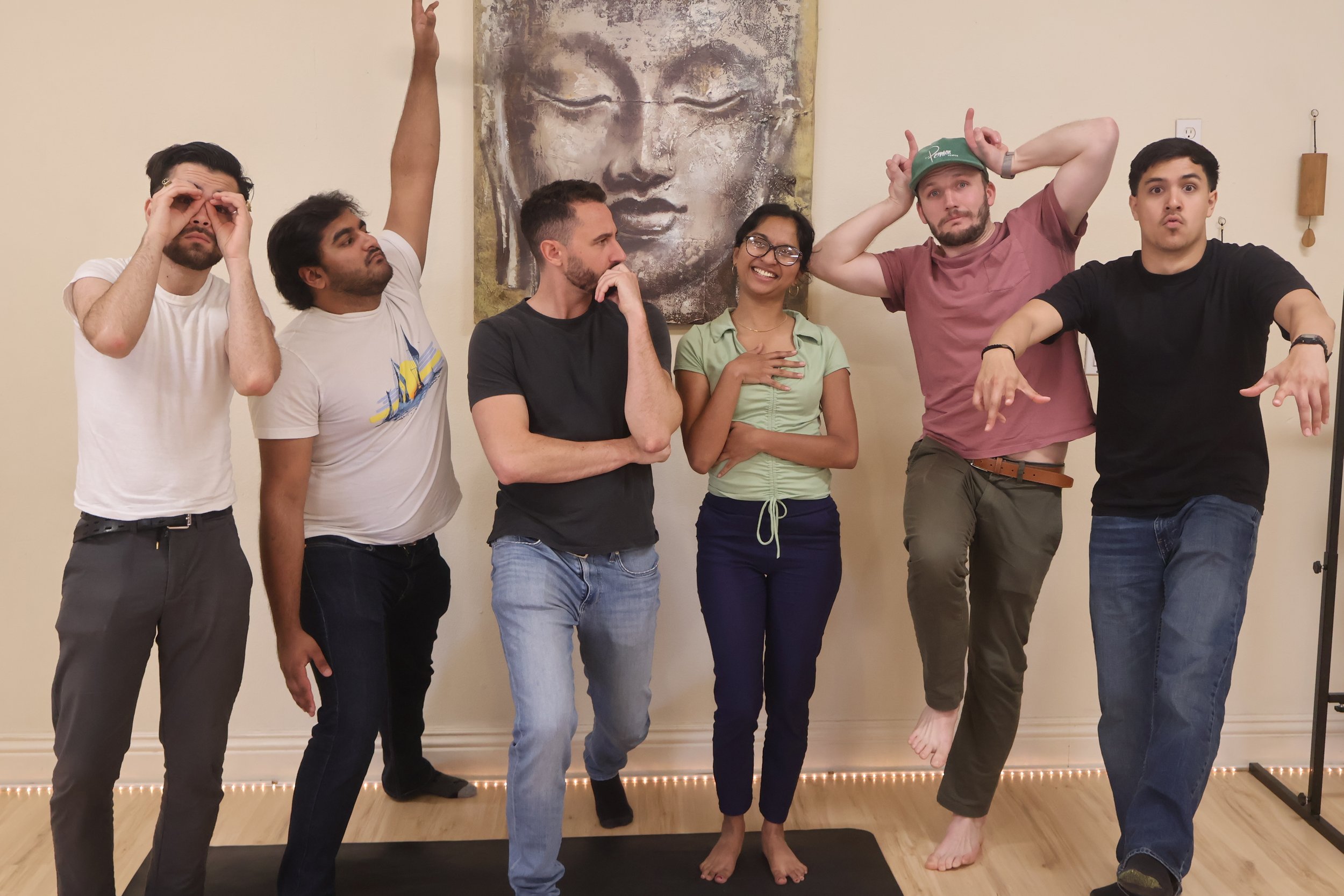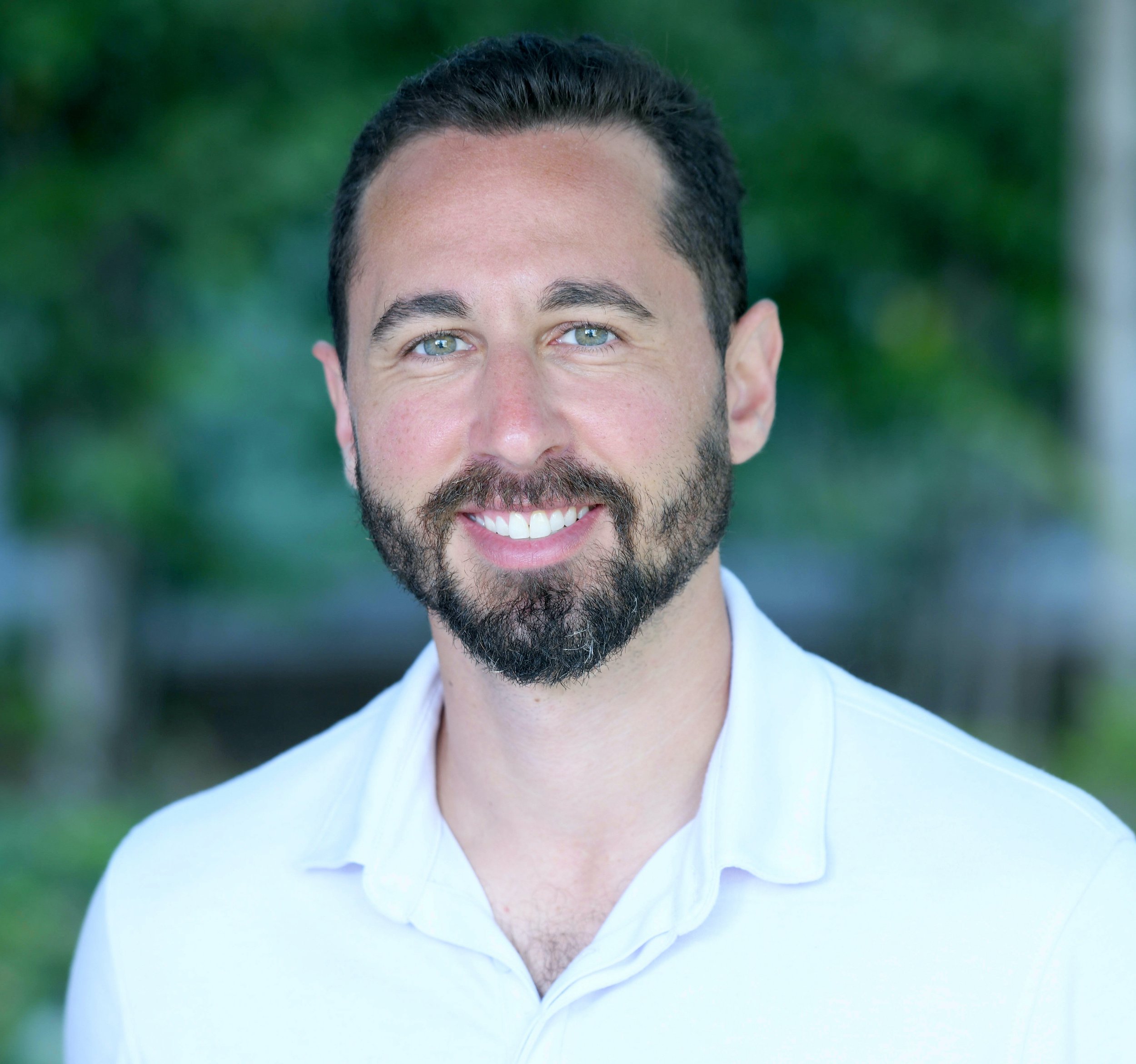
Learn to be more present through play.
Zen-prov! uses improv-based games to train life’s key skills such as mindfulness, self-confidence, & self-compassion… all while laughing your butt off.
Upcoming Classes
Upcoming Classes (Metro Detroit):
In-Person
Online (Live)
Upcoming Classes:

What is Zen-prov!?
Zen-prov! uses the playfulness of improv to support personal growth.
Through a combination of improv games, guided mindfulness exercises, & group discussion, you'll practice living more in the present moment, gaining self-confidence, being a better listener, working with your inner critic, and thinking more quickly on your feet. Zen-prov! is perfect for beginners who want to learn improv, and a novel way for experienced students and novices, alike, to explore the depths of their mind and learn to be more present.
Whether you are looking to become a more effective communicator at work, feel more confident in social situations, practice “getting out of your head,” or simply want to meet some great people and be silly for a couple hours, Zen-prov! supports your goals with purposeful play, behavioral science techniques, and practical philosophical/spiritual principles. Our goal is to not only have a blast; we also want the principles of improv to make an impact on your everyday life.
“Through Zenprov, I gained confidence in myself, the ability to be more present in my interactions, and a willingness to embrace the unexpected twists and turns of conversations.” —Jessica G.
What Others Are Saying…
“Extremely valuable for anyone seeking a way to develop self-trust in a playful and supportive environment." — Amy A.
“The activities were a great way to connect the group together. Most importantly the sharing from each individual created a culture of respect and personal growth into our journey with Mindfulness...” —Gabriel C.
“What an amazing workshop. I had no expectations going in, just the cringe of attempting improv because it felt like it would be embarrassing and uncomfortable. The Zen part, and Matt and the group's energy, shed all of those fears and left me feeling absolute support and joy throughout the experience. Loved and highly recommend.” —Stephanie L.
“Zen-prov combines the best of mindfulness practice and improvisation to create a uniquely warm, supportive and playful experience… If you are interested in deepening your confidence, insight and joy, this course is for you!” —Kat K.
“One of the reasons I came to Zen-prov was to get comfortable with being on the spot but what I hadn’t expected was just how much fun it would be. I finished every session feeling buoyed up… I couldn’t recommend Zen-prov highly enough!” —Lorraine M.
“I had been wanting to try improv, but with no acting experience, was looking for a class geared towards personal growth vs performance focused. Zenprov was the perfect blend… Was incredibly fun and transformative -- highly recommend.” —Jill S.
“I had always been intrigued about meditation and self-realization, but had never found the right time or venue to explore that. Zen-prov has been a natural, fun way to start learning these principles and seeing how they can fit into my life… Every zen-prov session yielded several “aha” moments, where I was able to reflect on something I said or did, and discover something new about myself.” —Rob G.
I would highly recommend this course to anyone who is completely new or curious about improv, or to those who have had some training and want extra time to practice and have meaningful discussions … Even if you are super nervous at the thought of improv, you are in safe hands here!” —Michelle M.
Who Is This Class For?
This class would be a good fit if…
You want to be more present in life — strengthen your mindfulness muscles by training your attention to be in the “here and now” via interactive games and exercises.
You want to be more self-compassionate — learn to work with your inner-critic through self-dialogue, role play, shifting your mindset, and embracing “failures” as gifts.
You want to better manage anxiety — practice tolerating uncertainty and stepping into the “unknown” in an atmosphere that is safe, supportive, and encouraging.
You want to be more flexible and resilient — strengthen your ability to respond to change by developing psychological flexibility.
You want to think more quickly on your feet — learn how to improvise your way through work situations, social conversations, and even life’s constant daily challenges.
You want to be more self-confident — develop greater confidence by learning to take more risks and care less about what other people think.
You want to be a better listener — engage in games and exercises designed to make you a stronger and more present listener and interpersonal communicator.
You want to trust your instincts and be more spontaneous — practice trusting your intuition, letting go of self-censorship and judgment, and going with your instincts.
You want to be a better collaborator — become more effective at working with teams, making others look good, and prioritizing the good of the whole over “self” via collaborative exercises.
*Please note this class is NOT psychotherapy and should not be used as a replacement for therapy or other medical treatment.
What Does Each Zen-prov! Class Consist of?
GAMES!
We’ll play improv games that will get your energy pumping and allow you to be silly, laugh, and blow off some steam.
REFLECTION!
We’ll do some guided meditations and other self-reflection exercises focused on getting to know your mind and “self” more deeply.
DISCUSSION!
Learning happens best in community. Each class, we’ll harvest collective wisdom from the group and have opportunities to speak what’s on our heart and mind in a safe and supportive container.
LEARNING!
You’ll probably learn some cool stuff, like how our nervous systems get in the way of being our most authentic selves, how “ego” self-sabotages everything, and tips on how to apply improv in real life. Coaching can be offered where appropriate.
About Zen-prov!
Origin Story
Well hello, there! My name is Dr. Matthew Goodman. I’m a Licensed Clinical Psychologist, speaker, and mindfulness teacher. I’m also the founder of this wonderful and weird improv space you’ve came across—Zen-prov! You may be wondering why and how this mash up of improv and Zen came to be. If so… read on!
I’ve experienced some pretty gnarly forms of anxiety for most of my life. I will spare you the drawn-out and unnecessary details, but eventually I discovered mindfulness/meditation practice and found this beneficial: improved focus, calm, resilience, and self-kindness. Upon graduating from Michigan State University, I moved to Los Angeles where I decided to live and practice in a Zen Buddhist monastery.
My mindfulness practice has helped me connect to deeper parts of myself, the world, and others. Yet, my experience has not been all “sunshine and rainbows.” During my stay at the monastery, for example, I went through my own version of a “dark night of the soul”—a not-so-uncommon phenomenon where people experience “adverse effects” in conjunction with meditation/spiritual practice. I eventually made a film about this.
When I entered graduate school to work on my Ph.D., I began taking improv classes… and it changed my life. Not only did improv offer many of the benefits I was searching for through meditation—improved presence and focus, less rumination and self-criticism, greater mental agility, less inhibition and greater confidence in social settings—I also rediscovered a sense of joy, playfulness, and spontaneity that had been washed up in the seriousness of life. I rediscovered something integral to my mind, body, and soul.
Later, upon starting my first post-graduate job as faculty at the Keck School of Medicine at USC in Los Angeles, I entered the Groundlings school (famous for producing SNL talent like Will Ferrell, Kristen Wig, Heidi Gardner, and many others), where I continued to be enchanted by the parallels between thriving on-stage and everyday life. I started to see improv as a Zen practice—an opportunity to work with the ego in a skillful way by becoming more present, less self-critical, more open and intuitive, and more willing to serve the greater whole. This inspired me to create Zen-prov!: a mashup of improv, Zen, behavioral science, and other tried-and-true personal growth tactics that help people discover the intricacies of their minds, develop skills to thrive in life, and form intimate bonds (and laughs) with others. I have since been teaching Zen-prov! in Los Angeles, Detroit, and worldwide (online) and absolutely love watching people grow through improv.
My hope is that through this class, you not only train your mind to be more present, less judgmental, more flexible and spontaneous, and more open to the gifts of life—and that this translates to tangible improvements in your life—but that you also find a sense of community, connection, and solidarity… all while laughing your a** off.
Warmly,
Matt
Subscribe to our newsletter
Subscribe to our newsletter
Watch/Listen
How improv helps us cope with life’s challenges - “Medium Day” Conference.
Improv, mindfulness, and letting go of control - Improve Podcast
Practicing Zen/mindfulness in the modern world - Dr. Goodman keynote event
Still curious about improv/Zen? Check out more resources here.

Zen-prov! CORE PRINCIPLES
Here’s a peek into some of what we’ll practice and co-discover during class:
Presence
The ability to be in the present moment. Synonymous with mindfulness. Presence can take the form of "focused attention" (concentration) or "open awareness" (insight or metacognition). The skill of presence underlies all other skills.
Not-Knowing
Willingness to be in the unknown. Evolutionarily, this allowed us to discover new territory, adapt, and evolve. It is the source of creativity/newness/potential. Organisms and systems that balance "known" and "unknown," or "order" and "chaos," are best poised to survive and thrive.
Self-Compassion
Treating ourselves the way we would treat a friend or loved one when we fail, feel inadequate, or suffer in some way. Not needing to be perfect. Knowing that we're human and have flaws, just like everyone else. Motivating ourselves through love vs. fear. Supports growth mindset.
Psychological Flexibility
Ability to adapt to each situation based on what serves this moment. Letting go of what we have planned. Requires deep listening. The ability to update our ideas/concepts/identities over the long-run.
Courage
Willingness to take risks, to step into the unknown. We don't have to jump head-first into fear, but can flirt with it on the edges (i.e., "growth edge"). Supports growth mindset. The goal is not to succeed at a task, per se, but to explore our own capacities.
Growth Mindset
Viewing failures and setbacks as opportunities to grow. The capacity to learn from our mistakes and enjoy the process of doing so. Our setbacks are not referendums on who we "are"—we are not fixed. Every success is built on multiple failures.
Serving the Whole
Recognizing our interconnectedness with everyone and everything and doing what helps the whole unit. What helps the whole ultimately helps ourselves.
Order and Chaos
The fundamental building blocks of the universe. Translated as "known" and "unknown"; "masculine" and "feminine"; "structure and "no structure.” Balancing these two polarities is key. In improv, Zen, and life, we strive to walk on the edge of order and chaos.
“Self”
The sense of being a fixed, enduring, discrete entity. Self keeps us separate. We attach to it because it makes us feel safe. We tend to believe "self-improvement" will lead to improved well-being, but it is sometimes the opposite: the more "self," the more suffering.
Questions? Comments? Want to ponder the meaning of life together?
If you have questions about classes, scheduling, class content, pricing, or anything else… reach out and we’ll get back to you soon :)

















